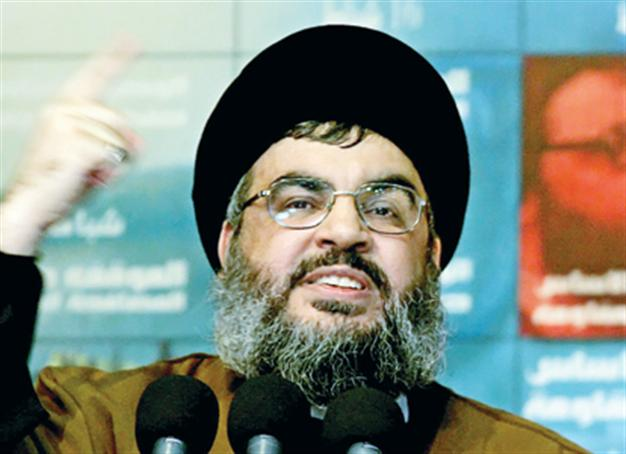
In this file picture, Hezbollah leader Hassan Nasrallah gestures as he delivers a speech during a ceremony. AFP photo
Hezbollah has partially unraveled the CIA’s spy network in Lebanon, severely damaging the intelligence agency’s ability to gather vital information on the terrorist organization at a tense time in the region, former and current U.S. officials said.
Officials said several foreign spies working for the CIA had been captured by Hezbollah in recent months. They added that the CIA informants, believed to be local recruits rather than U.S. citizens, were uncovered at least in part due to sloppy procedures - known in the espionage world as “tradecraft” - used by the agency.
The blow to the CIA’s operations in Lebanon came after top agency managers were alerted last year to be especially careful handling informants in the Middle East country. Hezbollah’s longtime leader, Sheik Hassan Nasrallah, boasted in June on television he had unmasked at least two CIA spies who had infiltrated the ranks of the organization.
The CIA declined to comment on the latest developments. Agency spokesman Preston Golson said the CIA “does not, as a rule discuss allegations of operational activities.” It remains unclear whether anyone has been or will be held responsible in the wake of this counterintelligence disaster or whether the incident will affect the CIA’s ability to recruit assets in Lebanon.
CIA officials, including the chief of the unit that supervises Hezbollah operations from CIA headquarters in Langley, Virginia and the head of counterintelligence, were warned their spies in Lebanon were vulnerable. Former and current intelligence officials are waiting to see how CIA Director David Petreaus, who took the helm in September, will handle the fiasco.
The State Department last year described Hezbollah as “the most technically capable terrorist group in the world” and the Defense Department estimates it receives between $100 million and $200 million per year in funding from Iran.
‘Hezbollah better than KGB’
Hezbollah has built a professional counterintelligence apparatus that Nasrallah, whom the U.S. government designated an international terrorist a decade ago, proudly describes as the “spy combat unit.” U.S. intelligence officials believe the unit, which is considered formidable and ruthless, went into operation around 2004.
Bob Baer, a former CIA operations officer whose books inspired the Hollywood movie Syriana, said Hezbollah’s counterintelligence capabilities are formidable and should not be underestimated. “Hezbollah’s security is as good as any in the world. It’s the best. It’s better than that of the KGB (the former Soviet spy agency),” Baer said.
Hezbollah has grown from a militia that fought Israeli forces in south Lebanon into the most powerful political and military force in the country. Hezbollah and its allies dominate the Lebanese government formed in June.
Using the latest commercial software, Nasrallah’s spy-hunters unit began methodically searching for traitors in Hezbollah’s midst. To find them Hezbollah examined cell phone data looking for anomalies, U.S. officials said. The analysis identified cell phones that, for instance, were used rarely or always from specific locations and only for a short period of time. Then it came down to old-fashioned, shoe-leather detective work: Who in that area had information that might be worth selling to the enemy? The effort took years but eventually Hezbollah and later the Lebanese government, began making arrests. By one estimate, 100 Israeli assets were apprehended as the news made headlines across the region in 2009. Some of those suspected Israeli spies worked for telecommunications companies and served in the military.
Meanwhile, the new head of a U.N.-backed court probing the murder of Lebanese ex-prime minister Rafiq Hariri, for which four Hezbollah members are accused, will travel to Lebanon this week, the court said Nov. 21.
Compiled from AP and Reuters stories by the Daily News staff.